

Top 10 Best eSignature APIs for Developers | Secure Document Signing

In today’s digital-first world, eSignature APIs have become essential for developers building applications that require secure and compliant document signing. From HR onboarding systems and sales platforms to legal case management and financial services, electronic signature integrations streamline workflows and provide businesses with legally binding agreements without the hassle of paper.
But with so many options on the market like Blueink, DocuSign, Adobe Sign, HelloSign, and others, choosing the best eSignature API can be overwhelming.
This article explores the top 10 best eSignature APIs for developers, comparing features, SDKs, pricing, integrations, and compliance. Whether you’re looking to embed electronic signature in your app, build a custom eSignature workflow API, or send documents for signature via API, you’ll find the right option here.
Why Developers Need an eSignature API
The role of an eSignature API extends far beyond simply replacing wet ink with digital signing. For developers, it unlocks automation, scalability, and compliance at the code level, while also ensuring end users have a smooth and secure experience. To evaluate the right solution, it helps to break the considerations into three main areas:
Developer-side considerations
- Ease of integration: APIs should come with clear documentation, SDKs, and sample code, with compatibility across popular frameworks to reduce implementation time.
- Customization and flexibility: The ability to configure workflows, signature methods, branding, and document formats ensures the API adapts to the specific needs of each application.
- Scalability: The API should reliably handle everything from a handful of daily transactions to thousands, supporting business growth without performance trade-offs.
Security and compliance considerations
- Security: Strong encryption, detailed audit trails, and secure handling of sensitive data are critical for protecting both businesses and signers.
- Compliance: APIs must adhere to regulations such as GDPR, HIPAA, and eIDAS, ensuring signed documents are legally valid in multiple jurisdictions.
Customer experience considerations
- User interface: Even if the integration happens behind the scenes, end users should enjoy an intuitive signing process, ideally optimized for both desktop and mobile with drag-and-drop functionality.
- Support: Developers benefit from providers that offer responsive customer service, ideally available around the clock, to resolve issues quickly and minimize downtime.
By balancing these dimensions, developers can deliver an electronic signature integration that is secure, compliant, and user-friendly, one that enhances productivity while keeping legal and technical risks under control.
The Top 10 Best eSignature APIs for Developers
1. Blueink eSignature API

Blueink is an outstanding eSignature API for organizations both small and large, offering a balance of developer-friendly tools, enterprise-grade security, and affordability. Its API enables secure document signing while giving developers flexibility through SDKs available in multiple programming languages, making integration straightforward across diverse platforms.
Blueink is built on strong security and compliance standards, including SOC 2 Type II, GDPR, the ESIGN Act, HIPAA, and FERPA. These certifications make it a trusted choice for industries such as healthcare, education, and government where compliance is critical.
Every transaction is backed by a detailed Certificate of Evidence, ensuring an auditable trail that reinforces legality and trust. You can learn more about these requirements in our guide on electronic signature laws.
In addition to compliance, Blueink provides advanced identity verification methods such as ID checks, selfies, and SMS pins, ensuring that every signature is secure and tamper-proof. The API makes it simple for developers to send documents for signature via API, embed signing experiences directly into applications, and design custom workflows that match unique business processes.
What sets Blueink apart is its affordability compared to alternatives like DocuSign and Adobe Sign, while still delivering enterprise-grade reliability. Its API is designed for flexible integration, allowing developers to embed eSignature functionality directly into their own systems, applications, or workflows without limitations.
Developers can create a free account for unlimited API testing to explore and integrate Blueink’s features before moving into production.
Blueink also provides dedicated customer support to assist developers and organizations throughout their integration journey, ensuring smooth adoption and ongoing success.
2. DocuSign API
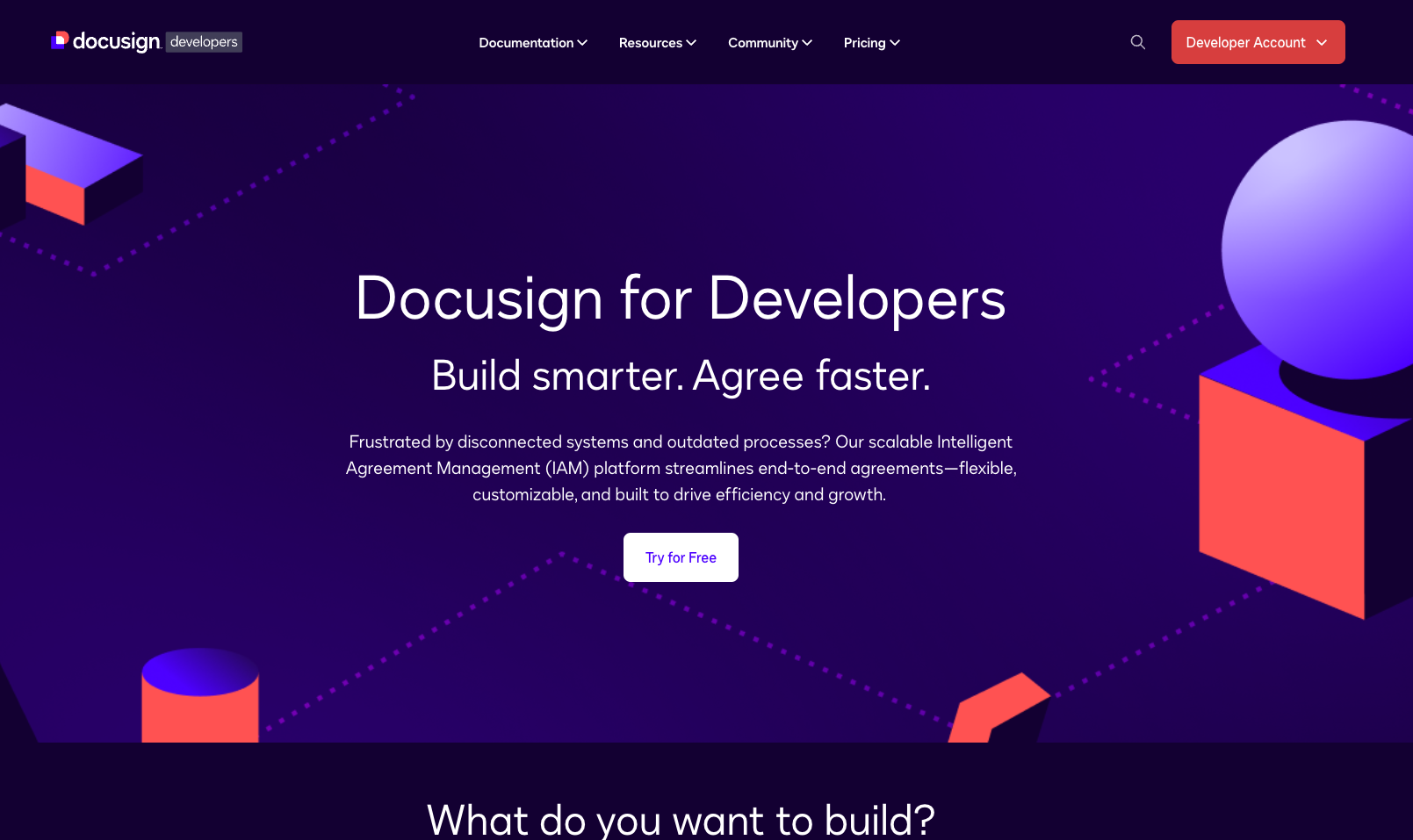
The DocuSign API is one of the most established eSignature APIs, providing developers with extensive tools to build and manage electronic signing workflows. It is designed as an electronic signature API for developers who need advanced capabilities, such as multi-step approval processes, conditional routing, and large-scale electronic signature integration with enterprise systems.
Through the API, organizations can send documents for signature via API, embed signing experiences directly into applications, and automate document workflows from preparation to completion.
The DocuSign eSignature SDK is available in multiple programming languages, which helps developers integrate and maintain signing functionality across diverse platforms. It also supports options to embed electronic signatures in app interfaces, making the signing experience seamless for end users.
Compliance is a core strength of DocuSign, with support for global standards such as ESIGN, UETA, GDPR, and eIDAS. These capabilities make it suitable for regulated industries that require legally binding digital agreements.
However, while it is powerful, the API can be more complex to implement compared to leaner solutions, and costs can rise quickly at scale. This makes it better suited for enterprises that prioritize customization and scalability over simplicity.
Support resources for the DocuSign API include detailed developer documentation, sample code, tutorials, and community forums. Enterprise customers also benefit from dedicated technical support.
Pricing is structured around premium plans, with enterprise-level features requiring higher tiers, which may be prohibitive for smaller organizations exploring an API for document signing.
3. PandaDoc API
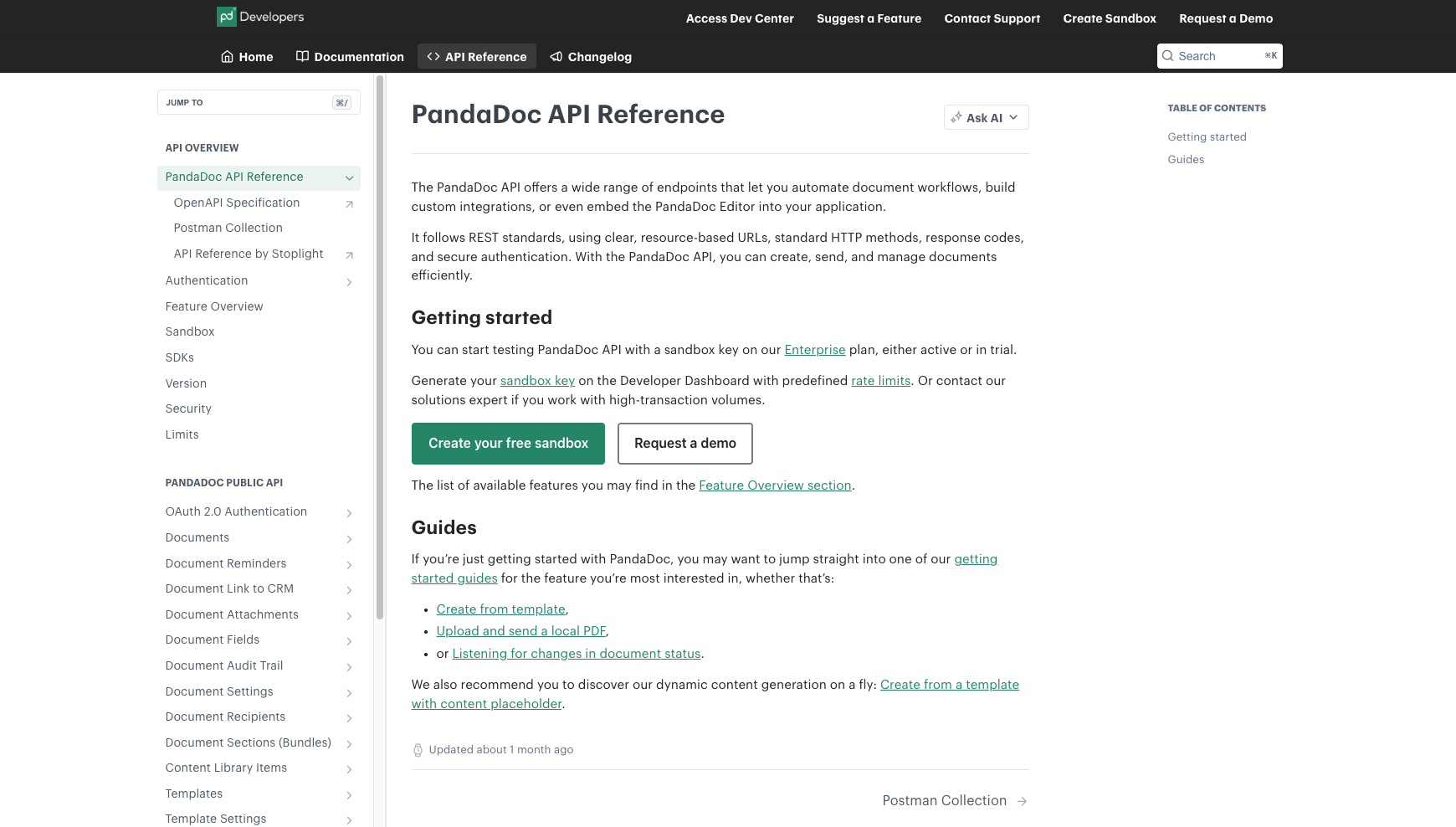
The PandaDoc API is an eSignature API that combines electronic signatures with document generation, making it especially popular for sales teams and organizations that rely heavily on proposals, quotes, and contracts.
It is designed as an electronic signature API for developers who want more than just signing, the API supports creating, editing, and sending documents programmatically.
Using the API, businesses can send documents for signature via API, merge data from external applications, pre-fill fields, and track agreement status in real time. Developers can also embed electronic signature in app workflows, allowing users to review, sign, and complete contracts without leaving the host application.
The PandaDoc eSignature SDK provides tools to accelerate electronic signature integration, although it is more tailored toward sales and customer-facing processes than highly regulated industries.
Compliance with standards such as SOC 2 and GDPR makes PandaDoc a secure option for general business use, but compared to a custom eSignature workflow API, it offers fewer options for complex authentication or identity verification. This focus makes it well-suited for sales operations but less flexible for sectors like healthcare or government.
Support for the PandaDoc API includes detailed developer documentation, sample code, and a knowledge base. Pricing follows a tiered model, which can become more costly as usage scales, but it provides businesses with the ability to grow document workflows and integrate deeper signing automation as needs expand.
4. Adobe Sign (Acrobat Sign) API
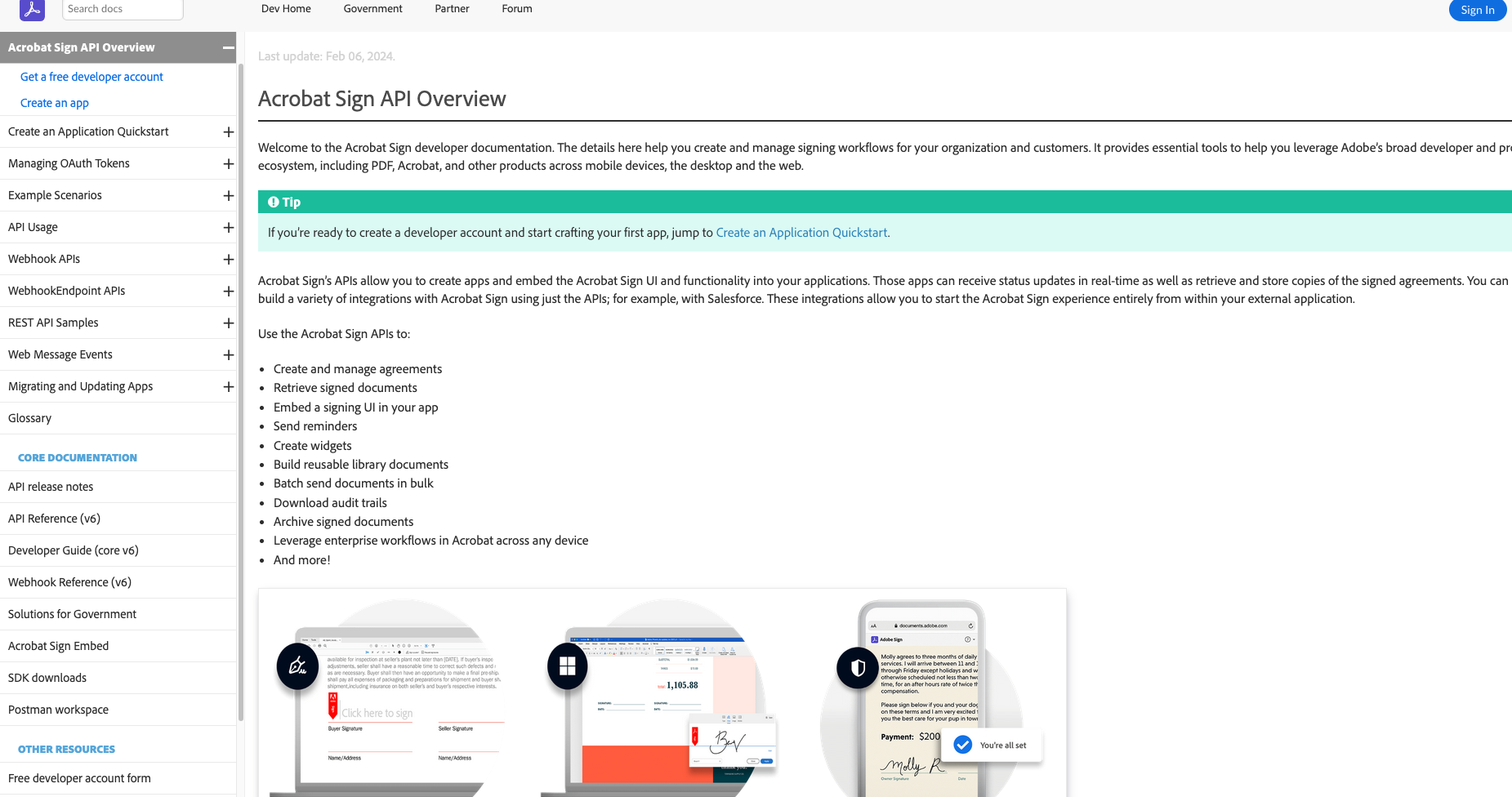
The Adobe Acrobat Sign API is an eSignature API within the Adobe Document Cloud that integrates closely with PDF tools. Designed primarily for PDF-based workflows, it is often considered when organizations want an electronic signature API for developers who already rely on Adobe Acrobat for document management.
The API works with both web and mobile applications and also supports low-code automation through Microsoft Power Automate, making it useful for teams seeking faster electronic signature integration without heavy coding.
Key features include the ability to send documents for signature via API, merge data from external applications, pre-fill form fields, store executed agreements in designated folders, and add team members for collaboration.
It also provides tracking to monitor document status from preparation through completion. While it performs reliably for PDF signing, it is less flexible as an API for document signing when working with non-PDF file types.
From a developer perspective, the Acrobat Sign API offers an eSignature SDK and supports options to embed electronic signature in app workflows, though customization is limited compared to providers that focus on offering a custom eSignature workflow API.
Support is primarily provided through FAQs, guides, tutorials, and community forums. Enterprise users can receive direct assistance, while smaller teams typically rely on self-service resources.
Pricing is bundled with Acrobat Sign itself and requires consultation with Adobe’s sales team. Developer accounts are available for testing, allowing developers to experiment before moving to production.
5. SignNow API

The SignNow API is an eSignature API designed to provide organizations with a practical balance of functionality and cost. It gives developers access to a straightforward electronic signature API for developers that can be integrated into existing applications or systems with relative ease.
With the API, businesses can send documents for signature via API, track the progress of agreements, and store completed documents securely. It also supports the ability to embed electronic signature in app workflows, so end users can review and sign documents directly within a company’s software environment.
Developers working with the SignNow eSignature SDK gain access to core signing features without unnecessary complexity, making it a viable option for teams that want faster electronic signature integration.
From a compliance standpoint, SignNow meets standards such as HIPAA, SOC 2, and GDPR, which makes it suitable for industries that need secure document handling, including healthcare and finance.
However, when compared to a custom eSignature workflow API, SignNow’s customization options for identity verification and advanced signing scenarios are more limited.
Support for the SignNow API is provided through documentation, guides, and FAQs, giving developers the resources they need to get started. Pricing is generally positioned to be more affordable than enterprise-focused competitors, which makes SignNow attractive for businesses that require a scalable API for document signing without enterprise-level costs.
6. Zoho Sign API

The Zoho Sign API is an eSignature API built to integrate seamlessly with the Zoho suite of applications, such as Zoho CRM, Zoho People, and Zoho Projects. For organizations already using Zoho products, it provides a straightforward electronic signature API for developers who want to embed signing capabilities into existing workflows with minimal friction.
With the API, businesses can send documents for signature via API, track agreement progress, and manage completed contracts within the Zoho environment. Developers can also embed electronic signature in app interfaces, ensuring that users sign documents without leaving the application they are working in.
While the Zoho Sign eSignature SDK is not as extensive as those offered by larger vendors, it offers enough functionality for smooth electronic signature integration within the Zoho ecosystem.
From a compliance perspective, Zoho Sign supports regulations such as GDPR and SOC 2, providing a secure foundation for general business use. However, its features are most effective when used within the Zoho ecosystem; compared to a custom eSignature workflow API, it offers less flexibility for highly complex or industry-specific signing requirements.
Zoho Sign API support includes documentation, FAQs, and tutorials, with paid plans offering customer assistance. Pricing is generally more affordable than many enterprise providers, which makes it attractive for small and mid-sized businesses already invested in Zoho products, especially those looking for a practical API for document signing without enterprise-level costs.
7. HelloSign (Dropbox Sign) API
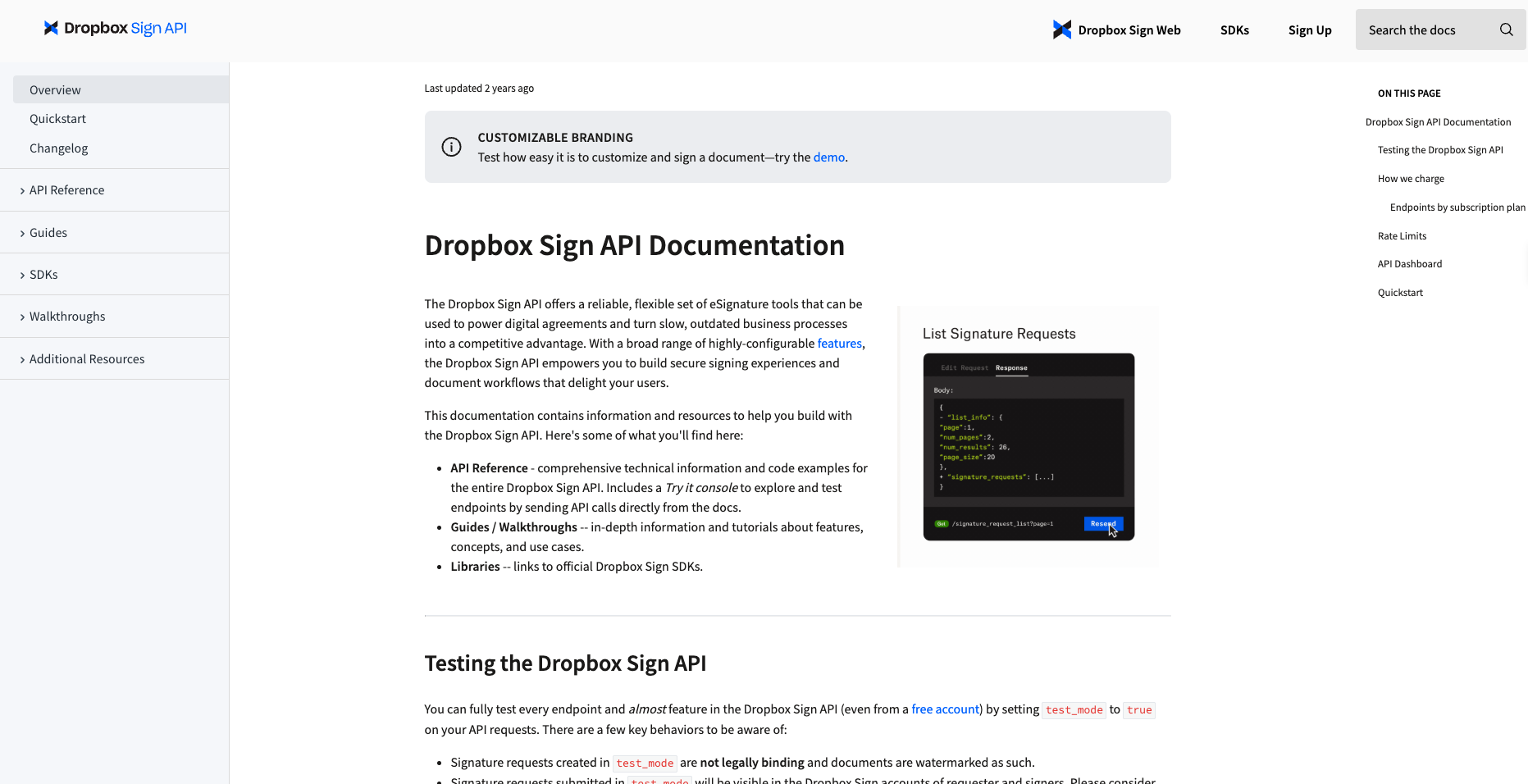
The HelloSign API, now branded as Dropbox Sign API, is an eSignature API known for its simplicity and ease of use. It is designed as an electronic signature API for developers who want a straightforward way to integrate signing features without heavy technical overhead.
For teams already using Dropbox, it provides smooth electronic signature integration into existing workflows. With the API, businesses can send documents for signature via API, set up automated signing processes, and embed electronic signature in app experiences so that users can sign directly within a product or website.
The HelloSign eSignature SDK supports modern frameworks and comes with clean developer documentation, making it accessible for developers who want to accelerate API for document signing implementation.
HelloSign meets compliance requirements such as SOC 2 and GDPR, which makes it suitable for general business use. However, compared to platforms offering a custom eSignature workflow API, it has fewer advanced authentication options and may not scale as effectively for industries with complex signing needs.
Support for the HelloSign API is provided through developer documentation, FAQs, and sample code. Pricing is offered in tiers, with API usage costs increasing as volume scales.
This positions HelloSign as a practical solution for startups and mid-sized companies looking for a user-friendly electronic signature API for developers, particularly those already in the Dropbox ecosystem.
8. BoldSign API
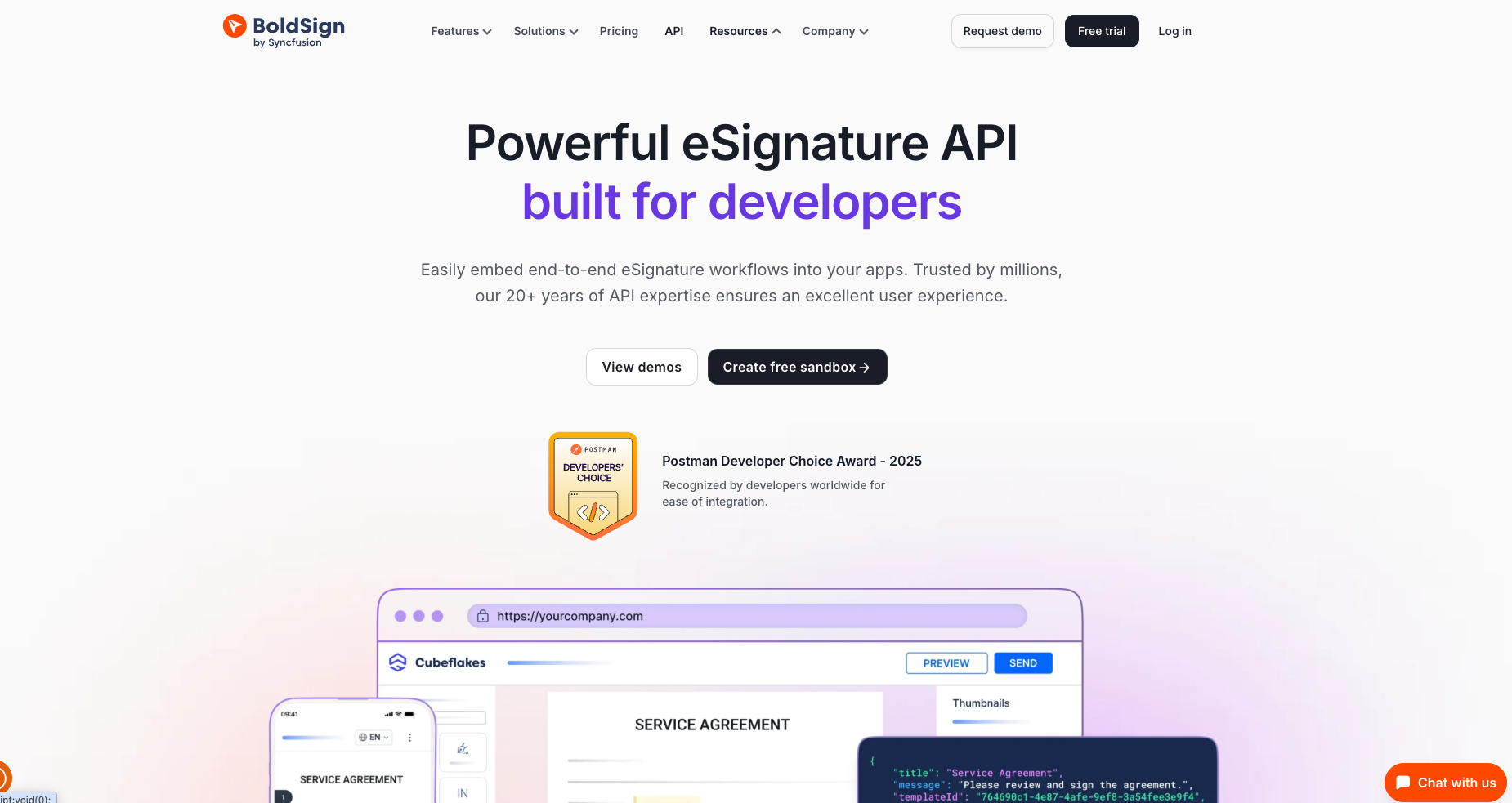
The BoldSign API, developed by Syncfusion, is a modern eSignature API designed with developers in mind. It provides a clean and lightweight electronic signature API for developers who want fast implementation and flexible integration options.
With support for .NET and JavaScript, the BoldSign eSignature SDK is particularly appealing to teams building applications on these popular frameworks.
Using the API, organizations can send documents for signature via API, manage recipients, and automate contract workflows with minimal setup. Developers can also embed electronic signature in app experiences so that signers can complete agreements without leaving the host application.
Its straightforward approach makes BoldSign a practical choice for teams that need reliable electronic signature integration without the overhead of complex enterprise platforms.
BoldSign complies with SOC 2 and GDPR standards, providing a secure foundation for digital transactions. While it covers essential signing requirements, its customization and advanced authentication options are more limited compared to a custom eSignature workflow API.
As a result, it is best suited for small to mid-sized businesses or development teams that value simplicity and speed over enterprise-level complexity. Support for the BoldSign API includes documentation, sample code, and tutorials that help developers quickly adopt the service.
Its pricing model is generally more affordable than traditional enterprise providers, making it attractive for organizations seeking a cost-effective API for document signing with developer-focused flexibility.
9. OneSpan Sign API
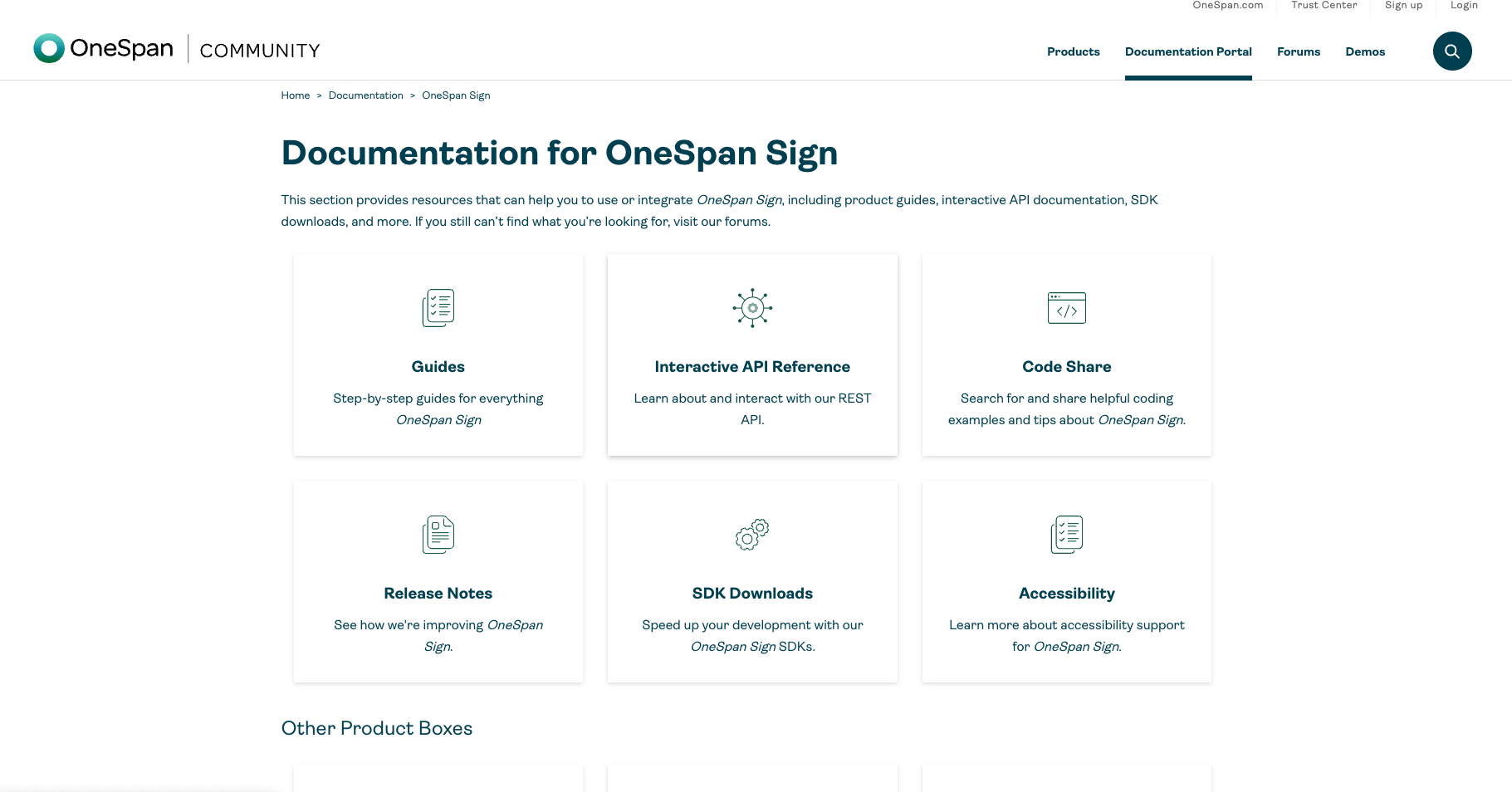
The OneSpan Sign API is an eSignature API often used in industries that require strict compliance, such as banking, insurance, and government.
It allows developers to send documents for signature via API, create approval workflows, and embed electronic signature in app environments. The OneSpan eSignature SDK also supports advanced features like multi-factor authentication and detailed audit trails.
While OneSpan complies with global standards including GDPR, HIPAA, SOC 2, and eIDAS, its platform is more complex and priced at an enterprise level, which can make it less accessible for smaller businesses.
For many organizations, this level of complexity is unnecessary, especially when a solution like Blueink provides strong compliance, developer-friendly tools, and affordability without the heavy enterprise cost structure.
Support for OneSpan Sign API includes documentation, developer guides, and enterprise-level assistance, but its focus remains on larger organizations. This makes it a better fit for specialized industries rather than businesses looking for a flexible and cost-effective API for document signing.
10. DocuSeal API
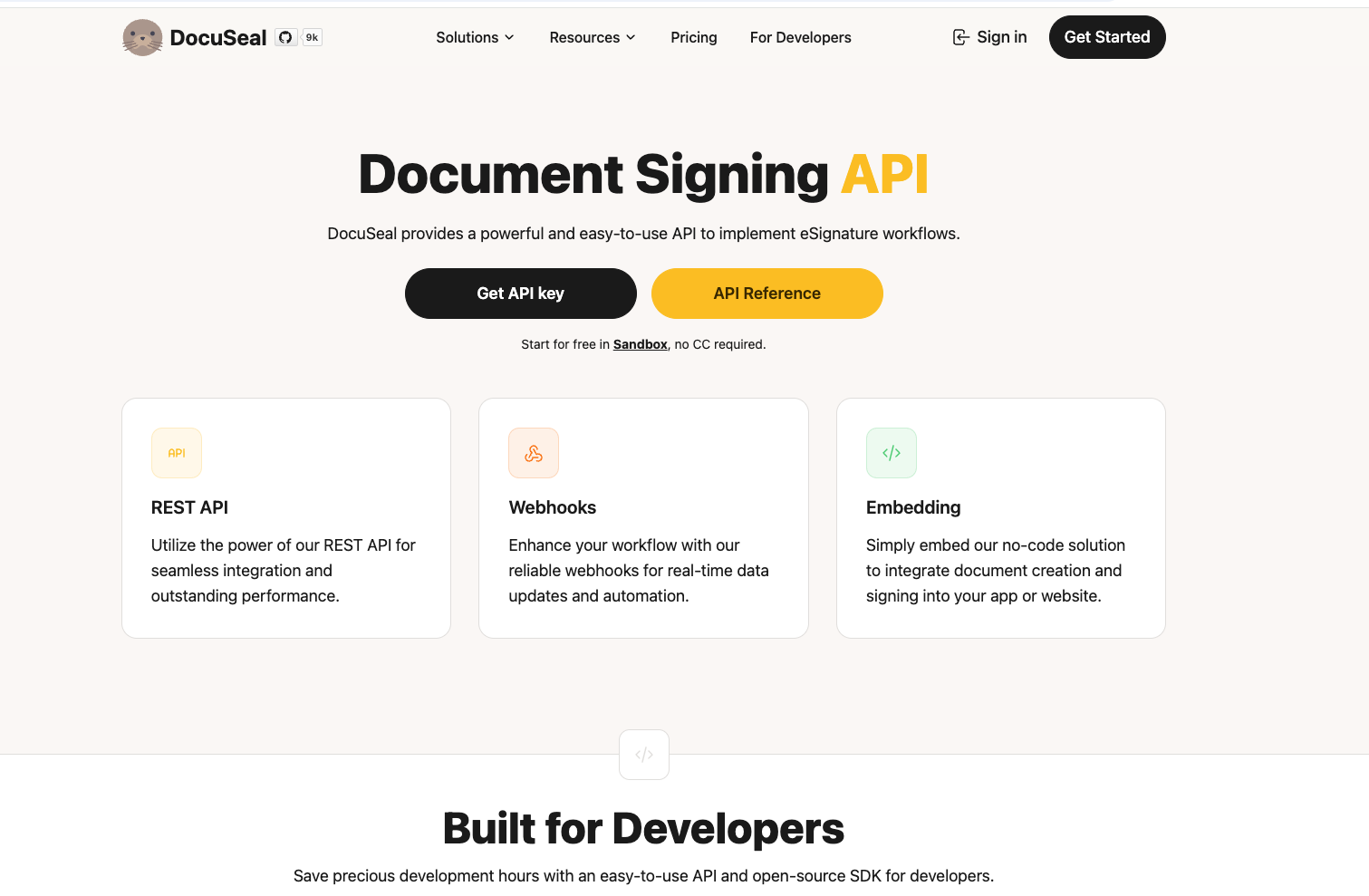
The DocuSeal API is an open-source eSignature API that appeals to developers who want full control over their signing infrastructure. It can be self-hosted, which allows organizations to manage their own servers, customize workflows, and build unique solutions without relying on a third-party SaaS provider.
This makes it attractive for teams looking for a flexible electronic signature API for developers that they can adapt to specific requirements. The API supports basic functions such as preparing agreements, assigning signers, and sending documents for signature via API.
Developers can also embed electronic signature in app workflows and use the available DocuSeal eSignature SDK to integrate signing capabilities into their software. However, because it is open source, ongoing security, maintenance, and compliance responsibilities fall entirely on the organization.
While DocuSeal provides freedom and cost savings in terms of licensing, it lacks the structured compliance certifications such as SOC 2, HIPAA, or GDPR that businesses in regulated industries often require. Compared to a custom eSignature workflow API from a managed provider, DocuSeal places a greater burden on developers to ensure data protection and legal enforceability.
Support is community-driven, with resources like GitHub discussions and community forums. This may be sufficient for tech-savvy teams but can pose challenges for businesses that need reliable support.
For organizations that value compliance, security, and professional assistance, a solution like Blueink is generally a stronger option because it combines developer flexibility with enterprise-grade compliance and dedicated customer support.
Choosing the Right eSignature API
Choosing the right eSignature API is a critical decision for businesses that want to modernize their document workflows and improve efficiency.
Solutions like Blueink, DocuSign, Adobe Sign, HelloSign, PandaDoc, SignNow, Zoho Sign, BoldSign, OneSpan, and DocuSeal each offer ways to integrate digital signing into applications, automate agreements, and ensure documents remain legally binding.
Some of these platforms are tailored for enterprise-scale deployments, others for sales enablement, and a few for niche or open-source flexibility. Yet when evaluating across compliance, developer experience, affordability, and customer support, Blueink clearly stands out as the best eSignature API.
It not only supports core capabilities like sending documents for signature via API and embedding electronic signature in app workflows but also gives developers the flexibility to build a custom eSignature workflow API suited to any business process.
Its security framework, which covers SOC 2 Type II, GDPR, HIPAA, FERPA, and the ESIGN Act, ensures every agreement is both secure and compliant, making it reliable for industries such as healthcare, education, finance, and government.
Another factor that sets Blueink apart is accessibility for developers. Unlike many providers that limit sandbox environments or trial access, Blueink offers a free developer account with unlimited API testing.
This allows development teams to experiment, integrate, and refine solutions with confidence before scaling into production. Combined with dedicated customer support, Blueink ensures that developers and organizations aren’t left on their own but have guidance at every step of their implementation.
For startups, Blueink provides a cost-effective entry point to secure digital signing. For enterprises, it offers the compliance, scalability, and reliability required to manage thousands of agreements without compromise.
Whether the goal is onboarding employees, signing sales contracts, managing vendor agreements, or supporting government workflows, Blueink delivers a solution that grows with your business.
In a crowded field of eSignature options, Blueink is the clear choice for organizations that want security, compliance, flexibility, and affordability in one platform.
It is not just an alternative to the bigger names. It is the smarter option for developers and businesses that want results without unnecessary complexity or cost.
FAQs About eSignature APIs
Q1. What is an eSignature API?
An eSignature API is a set of tools that lets developers integrate electronic signing capabilities directly into their applications. This allows businesses to automate workflows, securely collect signatures, and ensure compliance with legal standards without relying on paper-based processes.
Q2. Why should developers use an eSignature API?
Using an eSignature API helps developers unlock automation, scalability, and compliance at the code level. It makes it possible to embed signing workflows into HR platforms, sales systems, or legal case management tools while ensuring a seamless, secure user experience.
Q3. How do I choose the best eSignature API for my project?
Key factors to consider include ease of integration (clear documentation, SDKs, and sample code), customization options (branding, workflows, and file types), scalability, security (encryption and audit trails), and compliance with regulations like GDPR, HIPAA, and eIDAS.
Q4. Are eSignature APIs secure and legally binding?
Yes. Leading eSignature APIs, like Blueink, DocuSign, and Adobe Sign, use strong encryption, audit trails, and identity verification methods (such as SMS PINs or ID checks). They comply with global laws including ESIGN, UETA, GDPR, and HIPAA, making signed documents legally valid in most jurisdictions.
Q5. What makes Blueink’s eSignature API stand out?
Blueink combines affordability with enterprise-grade compliance, including SOC 2, GDPR, HIPAA, and FERPA. It offers advanced identity verification, a detailed Certificate of Evidence for every transaction, unlimited free API testing, and dedicated customer support—making it a trusted option for industries like healthcare, government, and education.
Disclaimer
Blueink is not a law firm and does not provide legal advice. This page is for informational purposes only and should not be considered a substitute for professional legal counsel. If you have questions about the validity or enforceability of eSignatures or digital signatures, we recommend consulting with a licensed attorney. Use of Blueink’s services is subject to our Terms of Use and Privacy Policy.


Weekly Newsletter
Get the latest updates, tips, and exclusive offers. Sign up for our weekly newsletter and stay informed!
Recent post
February 12, 2026
February 10, 2026
February 6, 2026
February 4, 2026
January 26, 2026
January 21, 2026
In today’s digital-first world, eSignature APIs have become essential for developers building applications that require secure and compliant document signing. From HR onboarding systems and sales platforms to legal case management and financial services, electronic signature integrations streamline workflows and provide businesses with legally binding agreements without the hassle of paper.
But with so many options on the market like Blueink, DocuSign, Adobe Sign, HelloSign, and others, choosing the best eSignature API can be overwhelming.
This article explores the top 10 best eSignature APIs for developers, comparing features, SDKs, pricing, integrations, and compliance. Whether you’re looking to embed electronic signature in your app, build a custom eSignature workflow API, or send documents for signature via API, you’ll find the right option here.
Why Developers Need an eSignature API
The role of an eSignature API extends far beyond simply replacing wet ink with digital signing. For developers, it unlocks automation, scalability, and compliance at the code level, while also ensuring end users have a smooth and secure experience. To evaluate the right solution, it helps to break the considerations into three main areas:
Developer-side considerations
- Ease of integration: APIs should come with clear documentation, SDKs, and sample code, with compatibility across popular frameworks to reduce implementation time.
- Customization and flexibility: The ability to configure workflows, signature methods, branding, and document formats ensures the API adapts to the specific needs of each application.
- Scalability: The API should reliably handle everything from a handful of daily transactions to thousands, supporting business growth without performance trade-offs.
Security and compliance considerations
- Security: Strong encryption, detailed audit trails, and secure handling of sensitive data are critical for protecting both businesses and signers.
- Compliance: APIs must adhere to regulations such as GDPR, HIPAA, and eIDAS, ensuring signed documents are legally valid in multiple jurisdictions.
Customer experience considerations
- User interface: Even if the integration happens behind the scenes, end users should enjoy an intuitive signing process, ideally optimized for both desktop and mobile with drag-and-drop functionality.
- Support: Developers benefit from providers that offer responsive customer service, ideally available around the clock, to resolve issues quickly and minimize downtime.
By balancing these dimensions, developers can deliver an electronic signature integration that is secure, compliant, and user-friendly, one that enhances productivity while keeping legal and technical risks under control.
The Top 10 Best eSignature APIs for Developers
1. Blueink eSignature API

Blueink is an outstanding eSignature API for organizations both small and large, offering a balance of developer-friendly tools, enterprise-grade security, and affordability. Its API enables secure document signing while giving developers flexibility through SDKs available in multiple programming languages, making integration straightforward across diverse platforms.
Blueink is built on strong security and compliance standards, including SOC 2 Type II, GDPR, the ESIGN Act, HIPAA, and FERPA. These certifications make it a trusted choice for industries such as healthcare, education, and government where compliance is critical.
Every transaction is backed by a detailed Certificate of Evidence, ensuring an auditable trail that reinforces legality and trust. You can learn more about these requirements in our guide on electronic signature laws.
In addition to compliance, Blueink provides advanced identity verification methods such as ID checks, selfies, and SMS pins, ensuring that every signature is secure and tamper-proof. The API makes it simple for developers to send documents for signature via API, embed signing experiences directly into applications, and design custom workflows that match unique business processes.
What sets Blueink apart is its affordability compared to alternatives like DocuSign and Adobe Sign, while still delivering enterprise-grade reliability. Its API is designed for flexible integration, allowing developers to embed eSignature functionality directly into their own systems, applications, or workflows without limitations.
Developers can create a free account for unlimited API testing to explore and integrate Blueink’s features before moving into production.
Blueink also provides dedicated customer support to assist developers and organizations throughout their integration journey, ensuring smooth adoption and ongoing success.
2. DocuSign API

The DocuSign API is one of the most established eSignature APIs, providing developers with extensive tools to build and manage electronic signing workflows. It is designed as an electronic signature API for developers who need advanced capabilities, such as multi-step approval processes, conditional routing, and large-scale electronic signature integration with enterprise systems.
Through the API, organizations can send documents for signature via API, embed signing experiences directly into applications, and automate document workflows from preparation to completion.
The DocuSign eSignature SDK is available in multiple programming languages, which helps developers integrate and maintain signing functionality across diverse platforms. It also supports options to embed electronic signatures in app interfaces, making the signing experience seamless for end users.
Compliance is a core strength of DocuSign, with support for global standards such as ESIGN, UETA, GDPR, and eIDAS. These capabilities make it suitable for regulated industries that require legally binding digital agreements.
However, while it is powerful, the API can be more complex to implement compared to leaner solutions, and costs can rise quickly at scale. This makes it better suited for enterprises that prioritize customization and scalability over simplicity.
Support resources for the DocuSign API include detailed developer documentation, sample code, tutorials, and community forums. Enterprise customers also benefit from dedicated technical support.
Pricing is structured around premium plans, with enterprise-level features requiring higher tiers, which may be prohibitive for smaller organizations exploring an API for document signing.
3. PandaDoc API

The PandaDoc API is an eSignature API that combines electronic signatures with document generation, making it especially popular for sales teams and organizations that rely heavily on proposals, quotes, and contracts.
It is designed as an electronic signature API for developers who want more than just signing, the API supports creating, editing, and sending documents programmatically.
Using the API, businesses can send documents for signature via API, merge data from external applications, pre-fill fields, and track agreement status in real time. Developers can also embed electronic signature in app workflows, allowing users to review, sign, and complete contracts without leaving the host application.
The PandaDoc eSignature SDK provides tools to accelerate electronic signature integration, although it is more tailored toward sales and customer-facing processes than highly regulated industries.
Compliance with standards such as SOC 2 and GDPR makes PandaDoc a secure option for general business use, but compared to a custom eSignature workflow API, it offers fewer options for complex authentication or identity verification. This focus makes it well-suited for sales operations but less flexible for sectors like healthcare or government.
Support for the PandaDoc API includes detailed developer documentation, sample code, and a knowledge base. Pricing follows a tiered model, which can become more costly as usage scales, but it provides businesses with the ability to grow document workflows and integrate deeper signing automation as needs expand.
4. Adobe Sign (Acrobat Sign) API

The Adobe Acrobat Sign API is an eSignature API within the Adobe Document Cloud that integrates closely with PDF tools. Designed primarily for PDF-based workflows, it is often considered when organizations want an electronic signature API for developers who already rely on Adobe Acrobat for document management.
The API works with both web and mobile applications and also supports low-code automation through Microsoft Power Automate, making it useful for teams seeking faster electronic signature integration without heavy coding.
Key features include the ability to send documents for signature via API, merge data from external applications, pre-fill form fields, store executed agreements in designated folders, and add team members for collaboration.
It also provides tracking to monitor document status from preparation through completion. While it performs reliably for PDF signing, it is less flexible as an API for document signing when working with non-PDF file types.
From a developer perspective, the Acrobat Sign API offers an eSignature SDK and supports options to embed electronic signature in app workflows, though customization is limited compared to providers that focus on offering a custom eSignature workflow API.
Support is primarily provided through FAQs, guides, tutorials, and community forums. Enterprise users can receive direct assistance, while smaller teams typically rely on self-service resources.
Pricing is bundled with Acrobat Sign itself and requires consultation with Adobe’s sales team. Developer accounts are available for testing, allowing developers to experiment before moving to production.
5. SignNow API

The SignNow API is an eSignature API designed to provide organizations with a practical balance of functionality and cost. It gives developers access to a straightforward electronic signature API for developers that can be integrated into existing applications or systems with relative ease.
With the API, businesses can send documents for signature via API, track the progress of agreements, and store completed documents securely. It also supports the ability to embed electronic signature in app workflows, so end users can review and sign documents directly within a company’s software environment.
Developers working with the SignNow eSignature SDK gain access to core signing features without unnecessary complexity, making it a viable option for teams that want faster electronic signature integration.
From a compliance standpoint, SignNow meets standards such as HIPAA, SOC 2, and GDPR, which makes it suitable for industries that need secure document handling, including healthcare and finance.
However, when compared to a custom eSignature workflow API, SignNow’s customization options for identity verification and advanced signing scenarios are more limited.
Support for the SignNow API is provided through documentation, guides, and FAQs, giving developers the resources they need to get started. Pricing is generally positioned to be more affordable than enterprise-focused competitors, which makes SignNow attractive for businesses that require a scalable API for document signing without enterprise-level costs.
6. Zoho Sign API

The Zoho Sign API is an eSignature API built to integrate seamlessly with the Zoho suite of applications, such as Zoho CRM, Zoho People, and Zoho Projects. For organizations already using Zoho products, it provides a straightforward electronic signature API for developers who want to embed signing capabilities into existing workflows with minimal friction.
With the API, businesses can send documents for signature via API, track agreement progress, and manage completed contracts within the Zoho environment. Developers can also embed electronic signature in app interfaces, ensuring that users sign documents without leaving the application they are working in.
While the Zoho Sign eSignature SDK is not as extensive as those offered by larger vendors, it offers enough functionality for smooth electronic signature integration within the Zoho ecosystem.
From a compliance perspective, Zoho Sign supports regulations such as GDPR and SOC 2, providing a secure foundation for general business use. However, its features are most effective when used within the Zoho ecosystem; compared to a custom eSignature workflow API, it offers less flexibility for highly complex or industry-specific signing requirements.
Zoho Sign API support includes documentation, FAQs, and tutorials, with paid plans offering customer assistance. Pricing is generally more affordable than many enterprise providers, which makes it attractive for small and mid-sized businesses already invested in Zoho products, especially those looking for a practical API for document signing without enterprise-level costs.
7. HelloSign (Dropbox Sign) API

The HelloSign API, now branded as Dropbox Sign API, is an eSignature API known for its simplicity and ease of use. It is designed as an electronic signature API for developers who want a straightforward way to integrate signing features without heavy technical overhead.
For teams already using Dropbox, it provides smooth electronic signature integration into existing workflows. With the API, businesses can send documents for signature via API, set up automated signing processes, and embed electronic signature in app experiences so that users can sign directly within a product or website.
The HelloSign eSignature SDK supports modern frameworks and comes with clean developer documentation, making it accessible for developers who want to accelerate API for document signing implementation.
HelloSign meets compliance requirements such as SOC 2 and GDPR, which makes it suitable for general business use. However, compared to platforms offering a custom eSignature workflow API, it has fewer advanced authentication options and may not scale as effectively for industries with complex signing needs.
Support for the HelloSign API is provided through developer documentation, FAQs, and sample code. Pricing is offered in tiers, with API usage costs increasing as volume scales.
This positions HelloSign as a practical solution for startups and mid-sized companies looking for a user-friendly electronic signature API for developers, particularly those already in the Dropbox ecosystem.
8. BoldSign API

The BoldSign API, developed by Syncfusion, is a modern eSignature API designed with developers in mind. It provides a clean and lightweight electronic signature API for developers who want fast implementation and flexible integration options.
With support for .NET and JavaScript, the BoldSign eSignature SDK is particularly appealing to teams building applications on these popular frameworks.
Using the API, organizations can send documents for signature via API, manage recipients, and automate contract workflows with minimal setup. Developers can also embed electronic signature in app experiences so that signers can complete agreements without leaving the host application.
Its straightforward approach makes BoldSign a practical choice for teams that need reliable electronic signature integration without the overhead of complex enterprise platforms.
BoldSign complies with SOC 2 and GDPR standards, providing a secure foundation for digital transactions. While it covers essential signing requirements, its customization and advanced authentication options are more limited compared to a custom eSignature workflow API.
As a result, it is best suited for small to mid-sized businesses or development teams that value simplicity and speed over enterprise-level complexity. Support for the BoldSign API includes documentation, sample code, and tutorials that help developers quickly adopt the service.
Its pricing model is generally more affordable than traditional enterprise providers, making it attractive for organizations seeking a cost-effective API for document signing with developer-focused flexibility.
9. OneSpan Sign API

The OneSpan Sign API is an eSignature API often used in industries that require strict compliance, such as banking, insurance, and government.
It allows developers to send documents for signature via API, create approval workflows, and embed electronic signature in app environments. The OneSpan eSignature SDK also supports advanced features like multi-factor authentication and detailed audit trails.
While OneSpan complies with global standards including GDPR, HIPAA, SOC 2, and eIDAS, its platform is more complex and priced at an enterprise level, which can make it less accessible for smaller businesses.
For many organizations, this level of complexity is unnecessary, especially when a solution like Blueink provides strong compliance, developer-friendly tools, and affordability without the heavy enterprise cost structure.
Support for OneSpan Sign API includes documentation, developer guides, and enterprise-level assistance, but its focus remains on larger organizations. This makes it a better fit for specialized industries rather than businesses looking for a flexible and cost-effective API for document signing.
10. DocuSeal API

The DocuSeal API is an open-source eSignature API that appeals to developers who want full control over their signing infrastructure. It can be self-hosted, which allows organizations to manage their own servers, customize workflows, and build unique solutions without relying on a third-party SaaS provider.
This makes it attractive for teams looking for a flexible electronic signature API for developers that they can adapt to specific requirements. The API supports basic functions such as preparing agreements, assigning signers, and sending documents for signature via API.
Developers can also embed electronic signature in app workflows and use the available DocuSeal eSignature SDK to integrate signing capabilities into their software. However, because it is open source, ongoing security, maintenance, and compliance responsibilities fall entirely on the organization.
While DocuSeal provides freedom and cost savings in terms of licensing, it lacks the structured compliance certifications such as SOC 2, HIPAA, or GDPR that businesses in regulated industries often require. Compared to a custom eSignature workflow API from a managed provider, DocuSeal places a greater burden on developers to ensure data protection and legal enforceability.
Support is community-driven, with resources like GitHub discussions and community forums. This may be sufficient for tech-savvy teams but can pose challenges for businesses that need reliable support.
For organizations that value compliance, security, and professional assistance, a solution like Blueink is generally a stronger option because it combines developer flexibility with enterprise-grade compliance and dedicated customer support.
Choosing the Right eSignature API
Choosing the right eSignature API is a critical decision for businesses that want to modernize their document workflows and improve efficiency.
Solutions like Blueink, DocuSign, Adobe Sign, HelloSign, PandaDoc, SignNow, Zoho Sign, BoldSign, OneSpan, and DocuSeal each offer ways to integrate digital signing into applications, automate agreements, and ensure documents remain legally binding.
Some of these platforms are tailored for enterprise-scale deployments, others for sales enablement, and a few for niche or open-source flexibility. Yet when evaluating across compliance, developer experience, affordability, and customer support, Blueink clearly stands out as the best eSignature API.
It not only supports core capabilities like sending documents for signature via API and embedding electronic signature in app workflows but also gives developers the flexibility to build a custom eSignature workflow API suited to any business process.
Its security framework, which covers SOC 2 Type II, GDPR, HIPAA, FERPA, and the ESIGN Act, ensures every agreement is both secure and compliant, making it reliable for industries such as healthcare, education, finance, and government.
Another factor that sets Blueink apart is accessibility for developers. Unlike many providers that limit sandbox environments or trial access, Blueink offers a free developer account with unlimited API testing.
This allows development teams to experiment, integrate, and refine solutions with confidence before scaling into production. Combined with dedicated customer support, Blueink ensures that developers and organizations aren’t left on their own but have guidance at every step of their implementation.
For startups, Blueink provides a cost-effective entry point to secure digital signing. For enterprises, it offers the compliance, scalability, and reliability required to manage thousands of agreements without compromise.
Whether the goal is onboarding employees, signing sales contracts, managing vendor agreements, or supporting government workflows, Blueink delivers a solution that grows with your business.
In a crowded field of eSignature options, Blueink is the clear choice for organizations that want security, compliance, flexibility, and affordability in one platform.
It is not just an alternative to the bigger names. It is the smarter option for developers and businesses that want results without unnecessary complexity or cost.
FAQs About eSignature APIs
Q1. What is an eSignature API?
An eSignature API is a set of tools that lets developers integrate electronic signing capabilities directly into their applications. This allows businesses to automate workflows, securely collect signatures, and ensure compliance with legal standards without relying on paper-based processes.
Q2. Why should developers use an eSignature API?
Using an eSignature API helps developers unlock automation, scalability, and compliance at the code level. It makes it possible to embed signing workflows into HR platforms, sales systems, or legal case management tools while ensuring a seamless, secure user experience.
Q3. How do I choose the best eSignature API for my project?
Key factors to consider include ease of integration (clear documentation, SDKs, and sample code), customization options (branding, workflows, and file types), scalability, security (encryption and audit trails), and compliance with regulations like GDPR, HIPAA, and eIDAS.
Q4. Are eSignature APIs secure and legally binding?
Yes. Leading eSignature APIs, like Blueink, DocuSign, and Adobe Sign, use strong encryption, audit trails, and identity verification methods (such as SMS PINs or ID checks). They comply with global laws including ESIGN, UETA, GDPR, and HIPAA, making signed documents legally valid in most jurisdictions.
Q5. What makes Blueink’s eSignature API stand out?
Blueink combines affordability with enterprise-grade compliance, including SOC 2, GDPR, HIPAA, and FERPA. It offers advanced identity verification, a detailed Certificate of Evidence for every transaction, unlimited free API testing, and dedicated customer support—making it a trusted option for industries like healthcare, government, and education.


